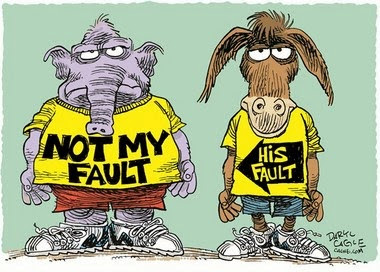No, it’s not that nothing has happened. Just that it has not been significant enough to create an interesting story that can go beyond two pages. Here’s all that you already know, but will cherish reading about social responsibility domain (we call it causes industry) of India.
So, the first-quarter results have started to come. As expected, not many companies have attached their corporate social responsibility reports with their financials; and only a handful have announced their plans. None of the business-focused dailies or otherwise prompt financial portals have any data on any company’s CSR spends. Oh yes, Tata did mention about their Rs 1,000 crore annual spends on social responsibility initiatives. But it wasn’t just the Tatas that we wanted to hear from, we all know that they have been doing it well before many of us even uttered ‘CSR’. Google news on CSR has nothing much to show for from the only country that mandates social spends through a unique legislation passed by its parliament and has the president’s seal on it.
Team CauseBecause was hooked on to various mediums, made several calls, wrote many mails in order to understand which of the development areas listed in Schedule VII is getting the maximum focus from the corporate world. However, we could not trace even five per cent of the Rs 20,000 crore fund that has been making news for quite some time now.
The newly emerged half-a-dozen CSR news-focused websites and CSR monthly magazines carried stories that said this company is doing X and that company will be doing Y or this known person from this company says Z… Nowhere could we really establish a direct connection, measure the real impact, or hear stories from the beneficiaries; neither could we see any programme that spoke for itself. No, we aren’t saying that it is not happening. We are saying it is not being measured and reported rightly.
Seemingly, the new focused (?) mediums are basically advocating their existence or responsibility though a comical you pat my back and I pat your back pact, wherein the substance and the meaning is missing.
Here’s a quick look at what’s happened, what is happening and what might continue to happen – as understood by Team CauseBecause.

Confusions, clarifications, and a new circular
Does it mean that all our existing CSR programmes should be quashed? Is it that we will be paying our employees to implement CSR, but not include their work hours in CSR? Will this money qualify? Is that donation justified? What about the tax? Hundreds of queries were raised, more clarifications were sought, and the new ministry obliged.
The last communication from the office of the newly appointed Corporate Affairs Minister Arun Jaitely (busy also with finance and defence portfolios) eased the pressure and cleared many confusions. Firstly, the circular clearly says that the statutory provision and provisions of CSR Rules, 2014, is to ensure that while activities undertaken in pursuance of the CSR policy must be relatable to Schedule VII of the Companies Act 2013, the entries in the said Schedule VII must be ‘interpreted liberally’ so as to capture the essence of the subjects enumerated in the said Schedule. The items enlisted in the amended Schedule VII of the Act are broad-based and are intended to cover a wide range of activities…
Along came the annexure that included activities such as consumer empowerment, salaries vis-Ã -vis work hours of employees working for CSR, road safety efforts and much more. Some people also questioned why donations made to Indian Institute of Management Ahmedabad (IIMA) qualified as CSR spend, to the exclusion of other b-schools. Were these new provisions included after persuasions by powerful lobbies or influential individuals? Well, we are not a Cobra Post or a Gulail and have no intentions of getting into that stinging domain.
Yes, the way some of the activities mentioned in the circular are forcibly included under ‘education’, it reflects a somewhat lenient attitude of the new regime towards CSR – unlike the UPA, which was just short of penalizing companies for noncompliance, and would have most likely done that had it got a third stint. The original copy of the new circular can be downloaded here.

Experts, consultants, Sections 8s and more…
‘Causes industry’ – Team CauseBecause coined this term after assessing the value of the capital that is being infused in the development domain and the number of organizations and people it engages. The numbers are only growing in volume as well as in value terms and with CSR’s shift from drawing room to boardroom, this causes industry will only become more organized.
Seeing potential, the b-school talent, which was once unavailable for this industry due to its petite remunerations, is now voluntarily entering the sector.
There’s a mail in our editor’s inbox. It is from two boys in their late twenties who passed out from India’s top b-school, currently employed at top companies and drawing six-figure salaries. They want to quit their cushy jobs and jump into this CSR wagon as they think it is going to be an interesting ride – the fund kitty is huge and we will do some meaningful work. They are looking at doing something around/with technology. However, they are yet to figure out what that something will be.
Yes, there are hundreds across India who are thinking like these boys. While many of them will make a lot of noise (some of which is needed at this time), some have already started to make some difference – young talented entrepreneurs with young powerful ideas helping in solving the old grassroots problems.
Of course, there’s the flip side. Over 50 per cent of management and business consultancies with global footprints, renowned chartered accountant firms, company secretaries, tax consultants, law firms, public relations agencies, event management companies, wealth managers, investment consultancies, human resource consultancies and more such business entities now have a CSR consultancy arm. While some are promising perfect CSR financials records, a handful of them are assuring business development or image management. Then there are others claiming to have cracked a loophole that will get companies their CSR compliance report without having to spend those two per cent of profits. Yes, those smart and witty bookkeeping lalaji firms too are seeking a share of this pie.
Workshops, seminars, roundtables, conversations
This was expected. With so many organizations seeking openings to connect and interact with professionals in this domain, several companies saw an opportunity and a never-ending season of CSR-focused events began. A CSR confrence here, a summit there, and a CSR congress elsewhere. Some even had ‘world’ and ‘India’ as prefixes in their titles. However, at all these events, the participation was dominated by almost the same set of represntatives of corporate groups and NGOs. Apart from the little small talks with known faces on the sidelines, these events lacked the much-needed substance and the value beyond mere we-do-this and this-may-be-done-like-this gyan talks. No newsworthy progress were ever reported. Oh yes, there are now awared for making an impact, but do we really need to talk about them?
NGOs’ bandwidth problem – social project implementation gaps
Yes, there are more than 20 lakh NGOs” about one for six Indians – registered in the country. However, if you do a bit of research, you’ll know that just about 10 per cent of them are actually operational (we may not get into what the rest 90 per cent does – many of you know that anyway).
And in this 10 per cent chunk, there’s capability and bandwidth gap – or to put it simply, the rich NGOs and poor NGOs gap. This chunk includes a few hundred large-sized foundations that are backed by million-dollar foreign donations coming from billion-dollar international foundations and are least interested in this new CSR kitty. Another lot in this 10 per cent chunk is the newly formed foundations of large business houses. These foundations act as CSR arms of respective corporate groups and implement their programmes with their listed implementation partners – just like companies have listed vendors. These listed NGOs form yet another pie of this 10 per cent rich and active NGOs.
Team CauseBecause tried to figure out the number of such NGOs and called up a few foundations and CSR wings only to find out that these are just a handful and have created their brand names. In fact, many of these implementing partners are actually listed with several corporate foundations as also on online donation platforms. Yes, your doubt is rightly placed – there are these rare ‘unethical’ organizations that are being funded by two or more foundations/corporate groups for the same programme. Why? Oh well, they have to do that to pay their PR and marketing bills… No, we are not kidding; you can call us to know the names not just of those organizations but also of their public relations agencies working on Rs 100,000 monthly retainer.

Oh! The IB report – a most-talked-about subject
<BRWhat NGOs say: ‘There are two kinds of people in the governance world. There are those who believe in the development sector and understand its complexities and limitations and also know its value. The others are the ones who have only seen the wrong side of the sector (which unfortunately is not a small side) and see most social enterprises from the same angle.’ This is the crux of the opinion of the leaders at most top-rung NGOs.
However, we dug a little deeper, managed to speak to a CSR lead at one of the large business conglomerates with major interests in mining businesses. Here is the crux of what she said (of course on condition of anonymity): ‘Our company started operations after getting all the necessary clearances from the government. The plans that were on the cards for the rehabilitation of the locals were something that those people would not have imagined, not to mention that within a couple of years the country would have been self-reliant and not dependent on the import of xxx. The country becoming self-reliant and cancelling of import orders worth millions was a big threat to metal lobbies that were selling to India. So, just before we could begin operations, an international NGO landed at the site and made all that hue and cry about the environmental hazards, etc. They raised issues of tribal dependent on the hills and did not even look at the plans that were in store for the better lives of those people… The matter took a political twist, national investigation commissions were set up, the project was stalled, and billions of rupees went down the drain. As a result, the tribals remain where they are, the best metal remains inside the earth, our company has earned a controversial reputation, and India continues to import metal, weakening our economy. Someone somewhere in an European hotel lobby is having a last laugh…’
CauseBecause view
Like all of you, Team CauseBecause also has an opinion. Actually each team member is looking at the current scenario from various perspectives – just like all of you. So, although the opinion had been penned down, we omitted it while publishing and decided to stay focused on seeing, recording and presenting things just as they are”for readers to make and keep their own opinions.
We anyway live in a world where somebody else’s opinion does not make much of a difference. At the same time, presenting of facts does initiate a thought process. Hence, that’s what we shall focus on.
Note to PR firms: CauseBecause receives at least a couple of press releases daily. Most of these releases talk about companies’ CSR initiatives. However, when a request for a meeting with a decision maker or a simple questionnaire is shared, only a few agencies revert and oblige. Please understand that our efforts are aimed at creating useful information in this niche domain.

